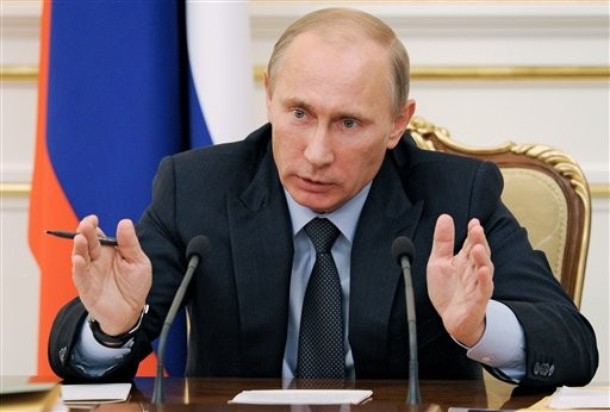The protests sweeping the Middle East have revolved around economics and accountability. After decades of corrupt and stagnant rule, Tunisians, Egyptians, Libyans and Syrians found themselves impoverished and no longer willing to acquiesce to dictatorship.
Russian Prime Minister Vladimir Putin’s announcement last month that he would seek a third presidential term raises the possibility that Russia, too, might experience protests in its future.
When it comes to Putin’s strongman ambitions, American officials face the same conundrum that they did in the Middle East. Too often in the region diplomats preferred the stability of the known to the potential instability of the unknown. However, if Washington applies one lesson from the Middle East to other regions of the world, it should be that deferring pressure for reform brings not stability; rather, it promises far more instability down the road.
This is particularly true of Putin. Absent meaningful reform, his corruption and cronyism will likely destabilize Russia.
These debates should be front and center with regard to the future of U.S.-Russian relations. This is especially true as both Russia and the United States head into an election season, and as the U.S. Senate is about to confirm a new ambassador in Moscow, Michael McFaul.
Russia may be closer to the civil unrest threshold than some diplomats acknowledge, and so might provide fertile ground for a “Russian Spring.” Recently, the deputy director of the Paris Institute for International and Strategic Relations, Didier Billion, was quoted in the French daily Le Monde as saying, “Russia and China, being far from true democracy, refer with anxiety to the ‘Arab Spring’ in general, since it can serve as the model for their own people.”
Robert Kagan, a senior fellow at the Brookings Institution, wrote last June that Russians are “angry about rampant corruption at the highest levels.” He went on to observe that even a think tank close to Putin’s United Russia Party believed that the Russian government was suffering a “crisis of legitimacy.”
The economic turmoil of the 1990s disillusioned Russians, who embraced Putin as he restored the order that they craved. But, like many Middle Eastern rulers, Putin failed to diversify the economy, delivering instead short-term growth due mainly to high oil prices. But luck favors no one indefinitely. According to former Finance Minister Alexei Kudrin, a fiscal conservative who advocated reforms and stepped down last month under pressure, a drop in oil prices to below $60 per barrel could cripple the economy, as the government bases its spending on a price of slightly over $100 per barrel.
Unlike many Arab states, but like Iran, Russia faces a demographic problem. Low birth rates and an aging population will exacerbate budgetary problems. Putin will have trouble making pension payments as the work force declines in numbers. Compounding the problem, Russian productivity is at most 10 percent of that of the United States, according to Mikhail Prokhorov, the former leader of Russia’s increasingly pro-Putin Right Cause Party.
While Putin still enjoys high popularity among the Russians, the future already looks uncertain. Recent travelers to Moscow and many Russia watchers have compared Putin to the late Soviet leader Leonid Brezhnev, whose name is synonymous with zastoi, or stagnation. Brezhnev’s policies resulted in slow growth, poverty and severe shortages of food and basic goods, all of which contributed to the eventual collapse of the Soviet Union.
Just as the Arab world has faced a brain drain, young, talented and educated Russians are also considering leaving their homeland. A recent Levada Centre survey found that 22 percent of Russian adults would like to leave Russia permanently – the highest figure since the Soviet Union’s collapse and a more than threefold increase from four years ago. Their desire to leave has less to do with ideology than with frustration over Russia’s direction, and a lack of a future for them and their children. Russian oligarchs not only send their children to study in the West, they now prefer to remain there themselves.
Russians traditionally weather misery but, like many Arabs, there is a limit even to their patience with corruption, poverty, high unemployment, and cuts in basic commodities. It is true that Russia differs in many respects with the countries of the Middle East. However, poor living conditions and lack of hope for a better future is ultimately what drives unrest, no matter where it takes place.
Because Russia is now far more open than it was during the Soviet era, Russians have greater access to information, particularly through the Internet. It is no coincidence that Russia’s government is now talking about greater Internet censorship. This illustrates the concern of the authorities with the possibility of increased protests.
As in Egypt, Libya, and Yemen, such instability might bring good. But it could also unleash more brutal, xenophobic, and nationalist forces. Without a strong, sustained push for reform, a sequel to the “Arab Spring” farther north might not be so unrealistic.
Anna Borshchevskaya is the assistant director of the Dinu Patriciu Eurasia Center at the Atlantic Council. This commentary originally appeared in The Daily Star.
Image: putincabinet.jpg
